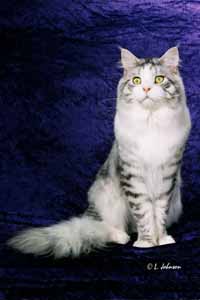


Photo courtesy of Larry Johnson Photography.
With such an easygoing nature, the Maine Coon is a delightful companion for children and gets along well with other pets. Playful, gentle and affectionate, the Maine Coon is also an extremely good mouser. Its mousing abilities have long been prized by farmers, particularly in the northern states.
Breed-related concerns
Every cat breed carries a distinct set of genetic advantages and health risk factors. The following are the most common diseases found in the Maine Coon breed. Hopefully, your Maine Coon will not face these problems. However, early detection and preventive healthcare can make all the difference in helping your cat live a longer, happier life (see breed-related disease descriptions below).
Kitten (birth to 1 year)
Adult (1 to 6 years)
Senior (7 years and older)
Breed-related disease descriptions
Listed in alphabetical order
Cardiomyopathy. Disease of the heart muscle that results in a thickened, scarred or flabby heart that is unable to pump blood effectively. This results in blood backing up into the lungs or abdomen. Signs may include loss of appetite, difficult or rapid breathing, abdominal distention, lethargy, weakness and sometimes sudden death.
Hip dysplasia. An inherited defect of the hip joint that results in arthritis due to premature wearing of the joint. Affected cats may show no clinical signs or may show reluctance to jump or hindlimb lameness.
Patella luxation. Misalignment of the kneecaps resulting in intermittent dislocation, pain and lameness. Symptoms include reluctance to exercise and lameness of the hind legs.
Help your cat live a longer, healthier life. Ask your veterinarian about a breed-related preventive health plan.